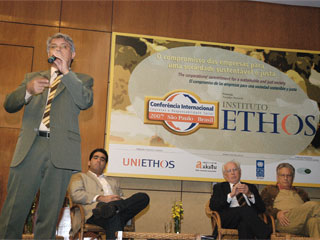Energy: debate lacks power
It is necessary to move forward in the proposals and seek a model that ensures development for the country
In the roundtable "Energetic matrix for sustainable development", held at the Ethos’ 2007 Conference, consensus was not reached on what routes Brazil must take regarding the energy issue. The moderator was professor José Goldemberg, former São Paulo State Secretary of the Environment and member of the Board of Instituto de Eletrotécnica e Energia, Universidade de São Paulo. When presenting their ideas, the representatives of organized civil society, Petrobras, and scientific community stuck to their points instead of trying to build a consensus on the theme.
Brazil, considered as a country with high potential for generating clean energy, still has 55% of its energy demand met by fossil fuels. Although the situation is more comfortable than the world figure – 80% of the energy used in the world is fossil fuel –, the country has not taken advantage of its potential for clean and renewable energy. Only 30% of the hydroelectric sector potential has been used. The amount and intensity of solar rays and the asset of seashore winds can also be exploited, as well as biofuels such as alcohol and biodiesel.
Petrobras’ representative, Mozart Schmitt de Queiroz, the company’s Energy Development executive manager, showed that the oil company is taking steps towards becoming an energy company. Petrobras’ total investment in renewable energies, however, accounts for just 1% of the total company investment in 2006. In Queiroz’s opinion, the decision to invest should be a government policy supported by the society. "Every time economically viable projects come up, Petrobras tends to invest in them," he asserted.
Luiz Pinguelli Rosa, former president of Eletrobras and designer of Proinfa (Alternative Energy Sources Incentive Program), stressed that hydroelectricity is a good energy option for the country. He said, in line with the Federal Government’s opinion, that barriers in the granting of environmental licensing hinder the construction of new hydroelectric plants in the country. Proinfa was created in 2002 and regulated by the Lula administration with the purpose of diversifying the national energy matrix. Today, after five years, it is still embryonic. According to Goldemberg, 70% of the projects planned by Proinfa are still on paper. After leaving the government, Pinguelli reassumed the position of coordinator of the Energetic Planning Program of COPPE and executive secretary of the Fórum Brasileiro de Mudanças Climáticas.
The director of campaigns at Greenpeace in Brazil, Marcelo Furtado, pointed out that the NGOs are willing to quit mere criticism and start developing alternatives. He presented the summary of the study entitled "Cenário de Revolução Energética" (Energy Revolution Scenario), which proposes cleaner and cheaper energy matrix to make Brazil self-sufficient in energy by 2050. The study proposes a matrix based on 88% renewable energies (38% hydroelectric, 26% biomass, 20% wind, 4% photovoltaic, and 12% natural gas from the Campos Basin). According to him, the study represents the generation of 1,077 TWh/year at R$ 350 bn. Furtado said the current government policy forecasts the generation of 1,639 TWh/year at R$ 530 bn, but it is dirtying the energy matrix. "The investment in renewable sources is minimum and the government hasn’t caught on yet," said Marcelo Furtado.
Professor José Goldemberg drew the attention to the need to move forward in the proposals and called "pseudo discussion" the debate on environment as a constraint on the approval of hydroelectric plants such as Rio Madeira’s, in the Northern Region of the country. "There are 100 million kilowatts whose environmental licensing have been approved, but are still on paper," he said. Goldemberg stressed that the problem is complex, once investing in energy is still bad business in Brazil. "Due to judicial uncertainty and lack of regulations that can guarantee a long-term return for investors, projects are approved but get stuck in the hands of middlemen. They are the ones who win the invitations to bid, hoping companies can buy into the projects, which eventually doesn’t happen", he said. In his opinion, the debate should urgently prioritize the search for a model to leverage the country’s development.
Fonte: Instituto Ethos

> Petrobras Watch the Petrobras coverage
© Copyright 2007, Instituto Ethos de Responsabilidade Social Empresarial. Todos os direitos reservados






